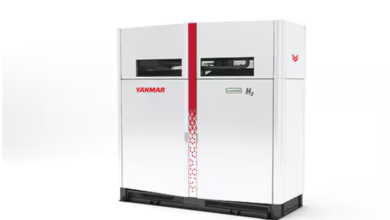Bosch to produce hydrogen electrolysers parts
Bosch believes in hydrogen as a future fuel and works on both stationary and mobile fuel cells.

Bosch Group today, 4th May, announced that it would enter the hydrogen market by producing the stack – the core component of an electrolyser.
Bosch will assign the development of electrolyser components to the Mobility Solutions business sector, investing up to €500 million in this venture by the end of the decade.
In light of energy diversification, the move away from fossil fuels, and the need to reduce CO2 emissions, demand for green hydrogen is growing rapidly in energy-intensive industries such as steel, chemicals, heavy-duty freight and private real estate.
Bosch forecasts that the global market for electrolyser components will increase to around €14 billion by 2030, with Europe set to see the highest growth rates. To help businesses and society reduce dependency on fossil fuels and harness new forms of energy, Bosch intends to invest some €3 billion in climate-neutral technology, such as electrification and hydrogen, over the next three years.
Bosch is collaborating with many partners to develop a way of combining the electrolyser stack with a control unit, power electronics, and various sensors to create a “smart module”. With pilot plants scheduled to commence operation in the coming year, the company plans to supply these smart modules to manufacturers of electrolysis plants and industrial service providers from 2025 onward.
Using a simple process, Bosch will incorporate a number of these compact modules. They can then be used both in smaller units with a capacity of up to ten megawatts and in gigawatt-rated onshore and offshore plants – whether in new-build projects or in existing plants for conversion to the production of green hydrogen. To maximise the efficiency of hydrogen production and extend the service life of the stack, the smart modules are to be connected to the Bosch cloud.
At the same time, the use of a modular design for the electrolysers is expected to make maintenance more flexible: any scheduled work will require the shutdown of certain sections of the plant only, instead of the entire facility. Bosch is also working on service concepts that will include recycling components to promote a circular economy.
Unlike many of the electrolyser components currently on the market, the Bosch smart modules will be mass-produced. As such, the manufacturing operation will generate economies of scale.
Bosch is now planning to start volume production as quickly as possible at several European locations. These include Bamberg and Feuerbach (Germany), Tilburg (Netherlands), Linz (Austria), and České Budějovice (Czech Republic).
Bosch plans to use mobile fuel cells to facilitate the climate-neutral shipping of goods and commodities, initially by truck. The company’s portfolio of vehicle-related products in this field ranges from individual sensors to core components such as the electric air compressor, the stack, and complete fuel-cell modules. Production is expected to start this year.
